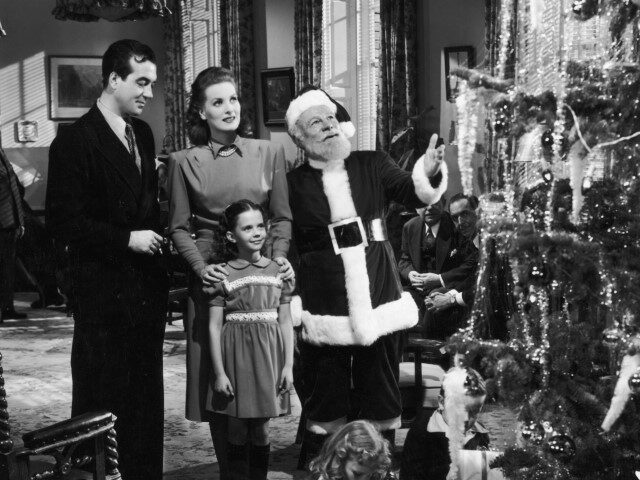If Die Hard is a Christmas movie, then Miracle on 34th Street (1947) is a Thanksgiving, Christmas, and Easter movie all rolled into one.
Easter? A man who performs miracles is betrayed by those close to him, gets locked up, and is made to stand trial where he must prove he is who he says he is. The movie’s courtroom climax becomes a showdown between believers and non-believers. As more than one character puts it: “Faith is believing things when common sense tells you not to.”
Santa Claus isn’t Jesus Christ. And Miracle on 34th Street isn’t The Passion of Kris Kringle. But the movie is an unmistakable religious parable whose Christianity is artfully encoded in the secular conventions of Old Hollywood storytelling at its finest.
The same is true for the movie’s deeply conservative worldview. Pay attention and you’ll see how much the movie disdains progressivism, champions the nuclear family, and ridicules big government. Adding extra-textual resonance are stars Maureen O’Hara and John Payne, who were among Hollywood’s most notable conservative actors at a time when being a conservative wasn’t a career death sentence.
What makes Miracle on 34th Street a classic is that none of this matters to the pure enjoyment of the film. The movie smartly avoids being what Martin Scorsese recently coined “a kind of cultural messaging delivery service.” There isn’t a political lecture or a religious sermon to be found — though this Christmas movie does have a Mother and Child, played by O’Hara and an eight-year-old Natalie Wood. And there is a sort-of Joseph — the next-door neighbor bachelor, played by Payne, who becomes a surrogate father.
But mostly, it entertains. And it’s funny, thanks in large part to Oscar-winner Edmund Gwenn. His Kris Kringle is the trickiest character because, especially early on, it’s ambiguous if he really is Santa Claus or a somewhat senile old man escaped from the nursing home. Both, it turns out.
Kris Kringle’s interactions with Natalie Wood’s Susan embody the essence of the movie’s conservative Christian ethos. Susan, who is in the second grade, doesn’t believe in Santa and her non-believer status clashes with Kris’ exhortations toward faith.
“It’s a progressive school,” she proudly announces. (Remember this is 1947!)
Kris’ reaction is priceless: “Oh, it’s a progressive school…”
And yet they become fast friends despite their fundamental differences. Susan never met her father, and so Kris helps play matchmaker between her workaholic mother and the interested next-door bachelor. Thus is born a nuclear family that, in the movie’s Norman Rockwell final sequence, abandons New York City for an idealized, picture-perfect home in the suburbs.
Miracle on 34th Street has a traditional Hollywood happy ending, but the movie is anything but sentimental. In fact, it harbors a stealth cynicism that serves as its secret weapon, elevating the movie from a cheerful holiday flick to something more complex.
In pure conservative fashion, that cynicism is directed at the government. Miracle on 34th Street‘s courtroom climax in which Kris Kringle must prove he really is Santa Claus is a passion play of political chicanery, judicial careerism, and bureaucratic buffoonery.
If you doubt this, consider the scene where the judge (Gene Lockhart) gets a schooling in the New Testament. “I’m telling you to get off this case,” his Tammany Hall-style political adviser warns him. “But why?” the hapless judge asks. “Because you’re a regular Pontius Pilate the minute you start. That’s why,” he replies.
The movie’s disdain for politicians is bipartisan. The judge is a Democrat, while the equally ineffectual District Attorney is a Republican (a GOP DA in New York City!). Neither wants to be on the case, and both are looking for a politically convenient way out.
The opportunity arises courtesy of another branch of the federal government — the U.S. Postal Service. A low-level mail sorter (a young, uncredited Jack Albertson) convinces his boss to forward dead-end letters addressed to “Santa Claus” to the courthouse — not because they necessarily believe Kris Kringle is Santa, but because they simply want to get rid of the backlog.
One government agency’s expediency serves as another’s political ace card. It doesn’t get more cynical than this. No one is more relieved than the judge, who can wash his hands of the case in a way that won’t jeopardize what he cares about most — re-election.
Miracle on 34th Street has no faith in government. Its faith is in faith itself.
An ironic post-script: this resolutely conservative Christian movie was a 20th Century Fox production, which means it is now owned by The Walt Disney Company.
Follow David Ng on Twitter @HeyItsDavidNg. Have a tip? Contact me at dng@breitbart.com

COMMENTS
Please let us know if you're having issues with commenting.